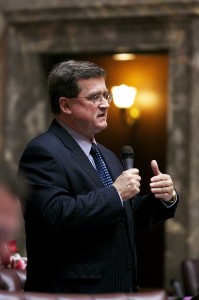 Sen. Curtis King, R-Yakima, and co-chair of the Senate Transportation Committee, today expressed his thanks and gratitude to members of the Senate and its staff after the unanimous passage of the Senate’s 2013-15 transportation budget proposal. King, along with co-chair Sen. Tracey Eide, D-Federal Way, and fellow budget writers Sen. Steve Hobbs, D-Lake Stevens, and Sen. Joe Fain of Auburn, spoke positively of the bipartisan atmosphere in which the budget was created.
Sen. Curtis King, R-Yakima, and co-chair of the Senate Transportation Committee, today expressed his thanks and gratitude to members of the Senate and its staff after the unanimous passage of the Senate’s 2013-15 transportation budget proposal. King, along with co-chair Sen. Tracey Eide, D-Federal Way, and fellow budget writers Sen. Steve Hobbs, D-Lake Stevens, and Sen. Joe Fain of Auburn, spoke positively of the bipartisan atmosphere in which the budget was created.
“When a committee has co-chairs with the same authority, the potential for gridlock is increased,” King said, “but Senator Eide has been an extreme pleasure to work with, as have our vice chairs. It’s been an honor to work with these individuals, the other members of the transportation committee, and both partisan and non-partisan staff, without whom none of this would have been possible.”









